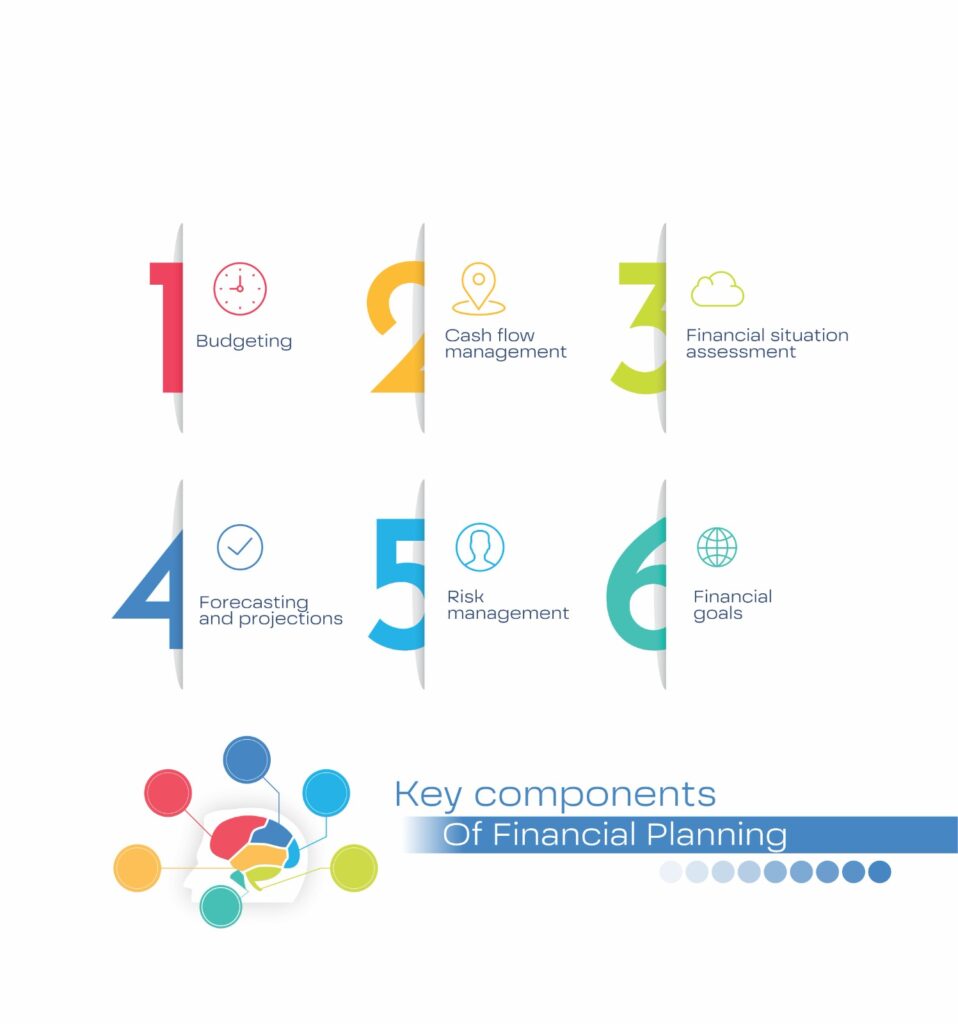In the world of commerce and industry, small businesses are one of the main drivers of economic growth in many countries. However, the path to success is fraught with obstacles, and in order to overcome these obstacles and succeed, the critical aspect of financial planning must be imbibed. Research conducted by Chris Welter and published in the New England Journal of Entrepreneurship found that businesses with a business plan have a higher likelihood of success than businesses that do not have a business plan. We will define what a financial plan is, why it is important, the critical elements that make up a financial plan, and propose effective strategies for implementing a financial plan.
What is Financial Planning?
Financial planning is the process of determining how a business venture will achieve its goals and objectives. It is an overall look at a business’s financial position and its growth projections. Financial planning is critical for the growth and long-term success of any business. Effective planning allows small business owners to make informed decisions, as this plan serves as a road map for achieving their objectives. Whether it be for expansion, innovation, or investing in technology.
Benefits of Financial Planning for Small Businesses

Stability and sustainability
Financial planning is not only for large corporations, it is also critical for the stability and sustainability of small businesses. A well-researched and carefully constructed financial plan can help reduce risks, guarantee cash flow, and help entrepreneurs navigate the uncertainties that are prevalent in the business world.
Strategic Decision-making
Financial planning usually involves data gathering; this ultimately affects the numerous decisions that entrepreneurs make, ranging from managing daily operations to planning for growth and expansion. Financial planning enables entrepreneurs to make informed and strategic decisions by giving them a clear picture of the company’s financial status. It also helps them make decisions that are consistent with their objectives.
Access to funding
Access to funding is critical for small businesses seeking to grow and expand into new markets. Having a business plan gives investors the confidence to loan you money. It shows that your company is credible. For many lenders, a well-defined and detailed financial plan is one of the criteria for accessing loans.
Increased efficiency
Financial planning gives life to your vision and dreams for your business; it helps to streamline processes and increase efficiency. Businesses can easily identify cost-effective solutions and proactively tackle inefficiencies.
Risk Management
A properly constructed financial plan will contain a carefully carried out risk assessment, thus anticipating potential roadblocks on the way to growth and setting up a financial safety net for unforeseen circumstances that may occur. Financial planning helps small businesses manage their risks effectively and find lasting ways to mitigate them.
Facilitates Growth
Financial planning aids the growth of any business. Entrepreneurs can make sales and profit projections. A financial plan gives a clear picture of a business’s financial position and helps the owners focus on long-term growth.
Key Components of Financial Planning

Budgeting
Budgeting is a key component of any successful financial plan. As defined by the Certified Institute of Management Accountants (CIMA), a budget is a “quantitative expression of a plan for a defined period. It may contain expected sales, revenues, resources, estimated costs and expenses, assets, liabilities, and cash flow.”. Budgeting entails estimating and assigning resources for a variety of business functions, such as production, marketing, operations, technology, and expansion. A budget also serves as a guide to keeping track of spending, enabling small businesses to manage their expenses and unnecessary debt. There are different types of budgets, such as sales budgets, operations budgets, marketing budgets, project budgets, and expenditure budgets.
Cash flow management
Cash flow gives an entrepreneur an understanding of how much money comes in and goes out of the business. Effective cash flow management is a key element of financial planning; it entails tracking the inflow and outflow of cash in order to ensure that the company can meet its short-term commitments. Small business owners must have a good understanding of payment timelines, receipts, invoicing, and inventory management, as well as effectively track expenses, in order to maintain a healthy cash flow.
Financial Situation Assessment
The first stage of financial planning for any small business is to assess its current financial situation from an objective standpoint. This gives the entrepreneur a holistic view and allows them to make informed decisions about the future. Knowing exactly where you stand financially in terms of current assets and liabilities is crucial. This analysis includes reviewing your income, monthly payments, expenses, bank statements, and tax receipts. This will enable you to see if your expenditure matches your inflow and how you can make amends if necessary.
Forecasting and projections
Forecasting for financial planning entails anticipating future trends and making informed assumptions about the company’s financial performance. It also involves making projections for sales, revenue, and expenses. It helps small businesses strategically plan for the estimated sales of revenue monthly, quarterly, and yearly. Forecasting allows entrepreneurs to anticipate challenges and roadblocks, identify opportunities for growth, as well as review and adjust their strategies if they fall short.
Risk Management
Risk assessment and management are crucial components of financial planning and, indeed, of any business at all. Every business is exposed to some level of risk; it can be as a result of pricing difficulties, market fluctuations, regulatory bottlenecks, government bureaucracy, or even force majeure. A good financial plan incorporates risk management strategies for identifying, assessing, and mitigating potential risks. This can include increasing a production line, expanding into new markets, diversifying operations, or just generally having a contingency plan in place to absorb the shock that unforeseen circumstances can bring.
Financial goals
Financial goals are also critical to financial planning. Establish clear goals and objectives for your business. Making these goals a part of the financial plan gives the business owner a mental picture of where they want the business to be and keeps them on track to achieve it. You can also break them into short term, medium term and long-term goals; this will make them more attainable.
Challenges faced by small businesses in financial planning

Lack of funds: one of the major challenges small businesses face is that they operate with limited resources. When you do not have enough resources at your disposal, it is difficult to allocate funds to critical areas of the business, which hinders financial planning.
Lack of expertise: most small business owners follow their passion in setting up a business, and as a result, they often lack the necessary expertise required for running the business. Financial planning requires an understanding of basic concepts like budgeting, cash flow management, expense tracking, and risk management. This sometimes seems like a daunting task for entrepreneurs; however, to combat this, they can engage the services of financial advisors and other professionals.
Regulatory Compliance: some business owners may struggle with meeting the requirements of some regulatory agencies like the Federal Inland Revenue Service, NAFDAC, or other agencies as it relates to their kind of business
Inconsistent policies: entrepreneurs also struggle to keep up with the ever-changing laws and regulations in some countries. When government policies are inconsistent, businesses cannot make financial plans or projections
Economic Uncertainty: Global and local economic conditions can have a significant impact on small businesses. Creating contingency plans and remaining proactive are critical for navigating economic uncertainties. Business owners must always include plans for unforeseen circumstances in their financial plans.
Fear of the unknown: fear is a powerful force and can hinder growth if allowed to thrive. Some business owners feel that since circumstances beyond their control are inevitable, financial planning is unnecessary. This is not true, as financial planning itself acts as a tool to cushion the effects of whatever challenges may occur in the life-cycle of the business.
As daunting as these challenges to financial planning may seem, there are practical steps that small business owners can take to overcome them.
- Education: knowledge, they say, is power; small business owners must prioritise financial education. They can learn financial concepts, industry trends, and regulatory requirements so that they are well-informed at all times about global and industry best practices.
- Small business owners can also engage the services of financial advisors to help them navigate through these challenges
- Finally, small business owners can seek collaborative partnerships. This partnership with other business owners and stakeholders within the industry creates platforms where they can share ideas and find ways to overcome the challenges they face.
Tools and Strategies for Financial Planning

Budgeting tools
Spreadsheets are an excellent budgeting tool that enables effective financial planning. They help you track your income and expenses, put a limit on your spending, as well as assign funds to critical areas of your business.
Accounting software
There are basic accounting software available for small business owners; this will help in cash flow management and inventory management. They make financial management easier for small businesses
Financial forecasting tools
Proper financial forecasting is critical for predicting future obstacles and opportunities. There are tools and techniques to help you make realistic projections. These tools use data to create multiple scenarios that help you make informed decisions.
Data Analytics
Small businesses can gain valuable insights by leveraging the power of data analytics, which drives enterprise and innovation. For effective financial planning, data analysis helps identify market trends, evaluate risks, and optimise financial strategies.
Investment evaluation tools
Small business owners use investment analysis tools to decide if an investment is worth making and in which areas to channel their investments. Whether it opening a new branch or buying more equipment, these tools give business owners a proper understanding of their venture’s performance, risks, and the investment that will yield the best returns.
Tax planning tools
Tax planning tools are available for small businesses to manage their tax filing processes and keep track of their taxes so that they do not fall behind or pay more than they are supposed to. These tools streamline the process of filing and managing taxes for effective financial planning.
Customer relationship management (CRM) Tools
CRM tools are used to manage customer databases and streamline operations, which aids in efficient workflows. Having a robust customer database helps business owners make strategic plans on how to meet their various needs and promote business growth. CRM tools are critical for entrepreneurs who want a well-implemented financial plan
Monitoring and reporting
Monitoring, evaluation, and reporting are effective tools for financial planning. Progress is measured against key performance indicators (KPIs). Financial planning is not a one-time event; it is a continuous process that requires ongoing monitoring and review of financial performance. This is necessary, especially if adjustments are needed, so that they can be quickly done to stay on track.
Strategies for financial planning include the following:
- Write your business goals and attach specific timelines for achieving them
- Write down a well-constructed business plan to help you achieve your goals
- Pay attention to your short-term goals first so that you don’t get overwhelmed
- Diversify your investments
- Time is an invaluable asset; use it wisely
- Regular review of financial statements
- Avoid unnecessary expenses
- Leverage technology
- Increase your cash flow and practice better cash flow management
- Finally, seek professional advice when necessary
Identifying and tracking key performance indicators that are relevant to the company’s financial objectives is critical for determining success. Growth rate, sales, profit, and customer reviews are all important for the financial health of any small business.
Employee Engagement in Financial Planning
As a small business owner, it is crucial to engage your employees/team members in the financial planning process, let them understand the goals and objectives, and work together to achieve them. After all, teamwork makes the dream work!
Organise financial literacy programmes to educate employees about the company’s financial health. This will foster a sense of ownership and accountability. Also, aligning employee incentives and rewards with the financial goals of the business can result in a motivated and engaged workforce.
Financial planning is the key to the success of any small business. By adopting an anticipatory approach to financial management, business owners can reduce risks, maximise resources, and pave the way for long-term growth. Having a well-defined financial goal for your business, as well as effective budgeting and cash flow management, all play an important role in determining the financial health of a business. As the ever-dynamic business landscape evolves, embracing technological advancements and seeking professional advice have become more important than ever before. Finally, a well-executed financial plan enables small businesses to overcome obstacles, take advantage of opportunities, and thrive in a competitive marketplace.

Leave a Reply